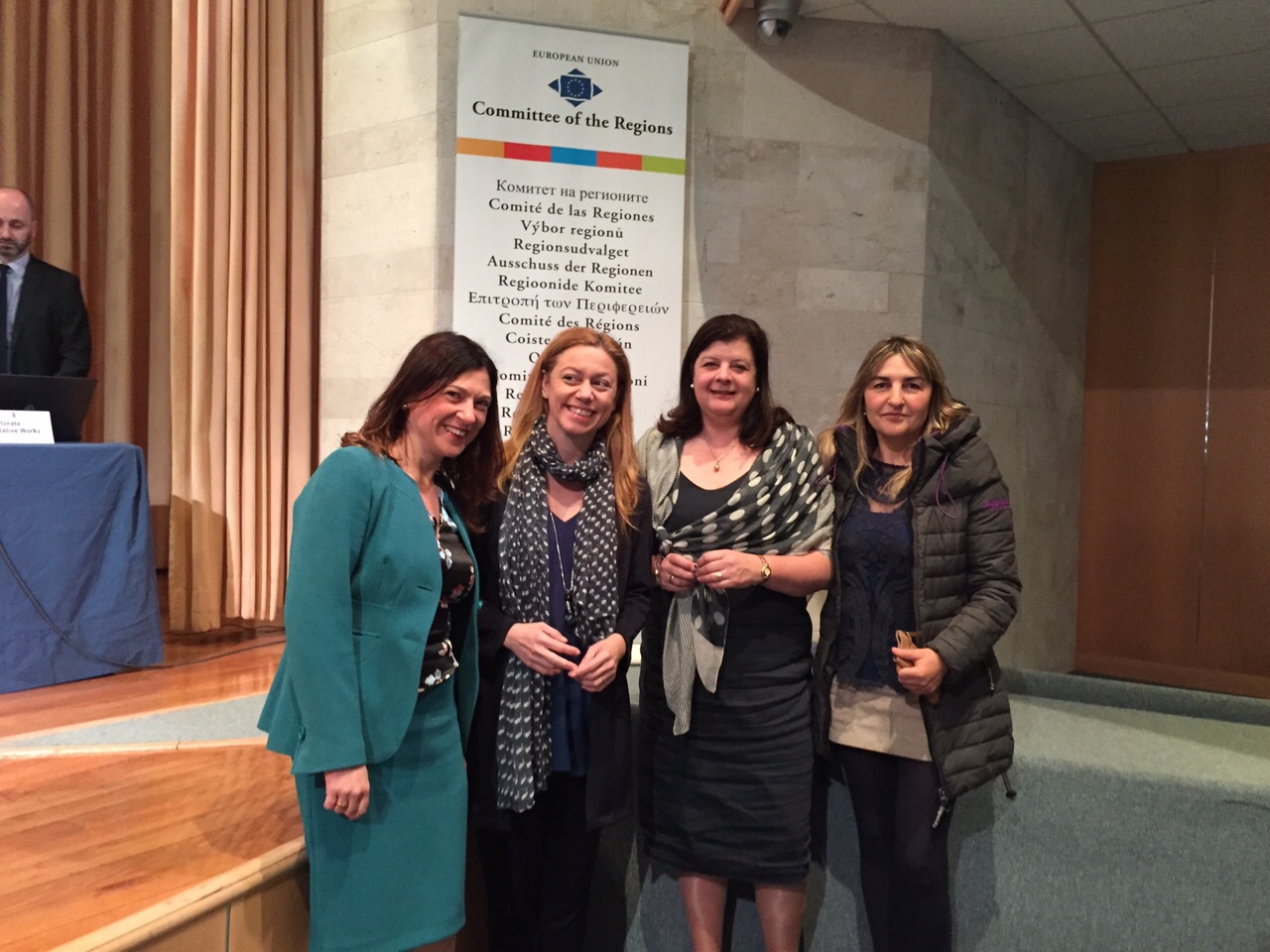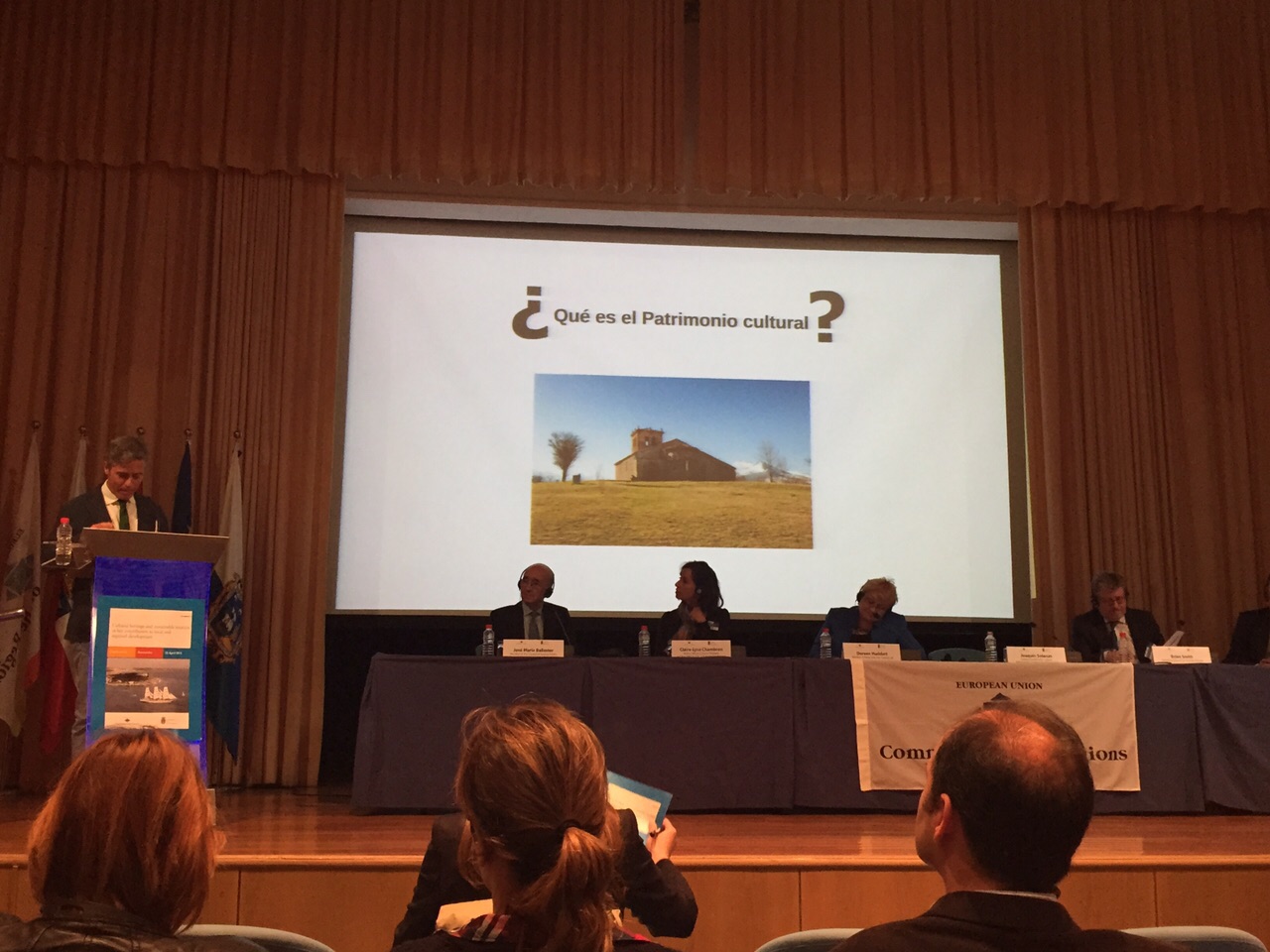On 30 April 200 participants from across Europe gathered in Santander, Spain, at this pivotal time to discuss the future of cultural heritage and sustainable tourism.The conference was organized by the Government of Cantabria in collaboration with the Committee of the Regions.

Immaculada Valencia, (Director General of Economy and European Affairs, Government of Cantabria), Cristina Mazas Pérez-Oleaga (Minister for the Economy, Finance and Employment of Cantabria), Lilian Grootswagers (FRH Council Secretary), Pilar Bahamonde (Director of the Centro de Estudios Lebaniegos)
Cultural heritage – consisting of resources inherited from the past in all forms and aspects (natural, built and archaeological sites, monuments, historic cities, artworks, museums, etc.) – is of major economic importance for the tourism industry in Europe. Its estimated annual revenue is worth EUR 335 billion and many of the 9 million jobs in the tourism sector are directly or indirectly connected to it. In the Cantabria region, the sector generated 524 EUR million in 2014, whilst providing 22,000 jobs. (Source: Committee of the Regions)
However, the benefits of the promotion of cultural heritage and sustainable tourism for regional development go far beyond their economic value.
In this regard, SEDEC Chair Yoomi Renström (SE/PES) underlined: “Not only is cultural heritage a generator of growth and employment, but also a cornerstone of local, regional, national and European identity, and an essential element of social cohesion and urban revitalisation. We therefore support the idea of having a ‘European Year of Cultural Heritage’ to further reap the benefits of Europe’s cultural resources”. She deplored the fact that “in many Member States investment in the field has been hit with budget cuts by more than a third in some cases”, stressing that “new ways of financing conservation of the EU’s immense cultural heritage must be sought. In view of the demographic and migration trends, it is all the more relevant for future regional and local development strategies to take account of the cultural dimension.”
According to Claire-Lyse Chambron, DG Education and Culture, European Commission:
“Europe’s cultural heritage is of great importance, in accordance with the Lisbon Treaty. The 2014 Commission Communication “Towards an integrated approach to cultural heritage for Europe” invites Member States and stakeholders to work together to maximise the intrinsic, societal and economic value of cultural heritage. It also highlights the opportunities to work more closely, making the most of EU policies and programmes.
According to Claire-Lyse Chambron, the cooperation among and with Member States, stakeholders and the Civil Society – represented here by FRH – has become increasingly stronger during recent years.
Furthermore, cultural heritage is among the four priorities of the Work Plan for culture 2015-2018.
Challenge is to evolve towards a more integrated and participative approach to cultural heritage, be it tangible, intangible or digital, and to strengthen the links between the local, regional, national et European levels of governance, always respecting the principle of subsidiarity.

Joaquin Solanas General Director of Culture for the Cantabria Government
The event follows on from the adoption of the CoR recommendations on the Commission’s communication that paves the way for “an integrated approach to cultural heritage for Europe”.
The CoR opinion had been prepared by Cristina Mazas who stressed that “whilst cultural heritage must not be merchandised, one cannot ignore the important role it should play in economic recovery”. She added: “Culture must not be seen as just another form of industry, but at the same time it is our duty to put together the right framework for developing a strong cultural industry that can create jobs, which remains our highest priority”. This view was echoed by Iñigo de la Serna, Mayor of Santander, who pointed out that culture was also a focus for Santander’s strategic development, in line with its city model.
Promoting sustainable tourism is a prerequisite for the growing jobs of the European economy. To achieve this goal, FRH is developing Religiana, a new tool to help managers of churches to promote community use and church tourism, by distributing basic information to an international standard. Religiana is developed by FRH and managed by a partner in each country. Religiana also encourages contributors to articulate their financial needs and users to make tax efficient on-line donations and aims to become the reference site for the sector.
Lilian Grootswagers, FRH Council Secretary, attended the conference: her presence highlights the fundamental strength and the importance of building strong partnerships in Europe at a regional level. Mrs Grootswagers was invited by the Cantabria Government, that is member of FRH.
Joaquin Solanas, General Director of Culture for the Cantabria Government, said: “Cantabria is the only Spanish region that has seen an increase in tourism. We believe that this is one of the main tools available for regional and local development”.
Solanas also brought the attention of the public on Religiana project.
According to Brian Smith, member of the Horizon 2020 Expert Group on Cultural Heritage: “Getting cultural Heritage to work for Europe argues that the European Union should vigorously promote the innovative use of cultural heritage for economic growth and jobs; social cohesion and environmental sustainability”.
Ilona Lelonek Husting, Policy Officer with the DG Enterprise and Industry, Tourism Policy Unit of the European Commission, said: “Europe is the first tourist destination in the world with 431 million international tourist arrivals in 2013, thanks to great cultural and historical heritage, natural assets, diversity of sceneries, quality service and good connectivity”.





Follow us: